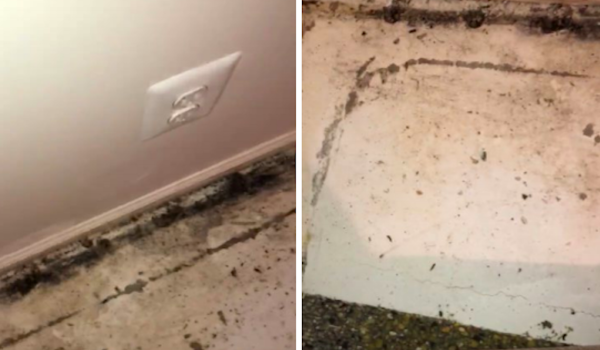

Ten military families are taking their privatized housing provider, Corvias, to court over “appalling housing conditions and cavalier treatment” at Fort Meade in Maryland, according to a new lawsuit.
The lawsuit filed on Tuesday by law firm Covington & Burling —which is handling the lawsuit pro bono, according to their press release — details “distressingly similar stories of poorly maintained infrastructure leading to serious problems, such as mold growing on walls, windows, and pipes,” at the the installation.
The lawsuit was first reported by the Washington Post. The defendants identified include Corvias Management-Army LLC and Meade Communities, LLC, which is a part of Corvias.
“Yesterday was Veterans Day, a national holiday to honor the men and women who serve and have served our Nation’s armed forces,” the lawsuit says. “While we as a nation honor our service members and their families, on U.S. Army Installation Fort George G. Meade, Defendants — the related private companies that are supposed to operate and maintain the on-base housing in a manner befitting the bravery of the men and women who reside there — have instead subjected these servicemembers to appalling housing conditions and cavalier treatment.”
“Requests for maintenance have gone ignored. Repair efforts, when made, have been substandard and slipshod attempts at cosmetic fixes that have not resolved the problems. All the while, Defendants have collected the full amount of the service members’ housing allowances, preventing them from moving off-base.”
Corvias spokeswoman Kelly Douglas told Task & Purpose that the lawsuit doesn’t reflect “the significant resources” that Corvias has poured into their housing units.
“We are aware of the complaint, filed yesterday, against Meade Communities, the partnership of Corvias and the Army, and it does not reflect the significant resources, attention and rigor that has been brought to assuring quality resident housing,” Douglas said.
One of the families mentioned in the lawsuit, Army Sgt. Joseph Addi and his wife Juliea, claim that they found excess water “accumulating in the cabinet” of a second-floor bathroom, and that the Corvias maintenance team “merely wiped the water off the cabinets and left.”
The Addis also reported finding cockroaches and millipedes “throughout the kitchen, living room, and first floor bathroom.” When contacted by the family, Corvias put down pest monitors and said they would return to check the traps in a few weeks. According to the lawsuit, they never returned.
The lawsuit also lays out a timeline during which the Addis dealt with mold in their HVAC closet, as well as in their second floor bathroom, which the lawsuit claims Corvias attempted “to ignore and conceal” by simply “patch and paint over the mold-covered walls in the master bathroom.”
Another family — Navy Petty Officer 2nd Class Kyle Bowers and her husband Antoine, along with their 19-month-old son — were put up in a hotel after months of dealing with mold contamination, per the lawsuit.
Corvias allegedly told the Bowers they were “perform remediation work on the townhome,” but when the Bowers were told they could move back in, they say they arrived to a “mess that Corvias left behind and a townhome that was still contaminated with mold.”
The lawsuit alleges that Corvias has “not fully remediated the mold at any of the residences” identified by the plaintiffs, but Corvias has “leased each residence to at least one more military family.”
This is not the first time Corvias has been in the news for complaints over housing. In 2018, Reuters reported that Corvias expects to earn $1 billion over the 50 years Corvias has a contact with the Pentagon, while tenants say they’re being rented “poorly maintained homes riddled with health hazards.”
Earlier this year, 88 Corvias homes at Fort Bragg were flagged to be at risk of carbon monoxide poisoning after a family went to the Womack Army Medical Center and showed symptoms consistent with the condition.
Corvias and Fort Bragg officials determined that the cause of the carbon monoxide buildup was the heating ventilation and air conditioning (HVAC) unit was inside the homes’ laundry rooms, claiming that levels became dangerous “only when the door to the laundry room was closed.”
The solution that Corvias presented in its press release about the issue was simply to remove the doors to those laundry rooms.
A survey from the Military Family Advisory Network released in May said that 93% of responses they received (from 15,901 surveyed adults) were from six housing companies, none of which had average satisfaction rates above neutral.
One of those companies was Corvias, along with Lincoln Military Housing, Balfour Beatty, Lendlease/Winn, Michals, and Hunt.
In addition, Corvias’ family housing had the lowest total score in a survey requested by the Department of the Army, which was published this summer.
Covington’s lawsuit references Corvias founder and CEO John Picerne’s February 2019 testimony to the Senate Armed Services Committee, in which he says that the company is “returning to the ‘gold standard’ level of resident care that defined our company from the start.” He outlines a number of steps that Corvias is taking to “do a better job” at serving their residents.
“In short,” the lawsuit reads. “Defendants recognize the problem and that it is their responsibility to fix it. But Defendants have not fixed it. The mold problems have not been solved, maintenance backlogs continue to delay much-needed health and safety repairs, and ‘remediation’ projects continue to be performed in a haphazard and improper manner.
“This is not the gold standard,” the lawsuit said. “This is no standard at all.”
